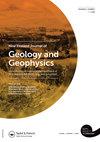Quaternary uplift and fault movement near Waitomo, North Island, New Zealand
IF 1.9
4区 地球科学
Q1 GEOLOGY
New Zealand Journal of Geology and Geophysics
Pub Date : 2021-11-14
DOI:10.1080/00288306.2021.1996401
引用次数: 2
Abstract
ABSTRACT The hill country of west central North Island, west of Te Kuiti and Otorohanga, is recognised to be slowly uplifting and relatively stable. The New Zealand national seismic hazard model shows the area to be in a low-risk zone and the New Zealand active faults database recognises no active faults in the region. However, dated evidence provided by speleothems in a cave near Waitomo indicates the intermittent movement of the Okohua fault from before the Last Interglacial until around 38 kyrs ago. Evidence of older movement along the Waipa Fault near Te Kuiti is also apparent from the vertical displacement of the Ngaroma ignimbrite (1.55 Myrs) by about 150 m in the interval prior to the deposition of the Ongatiti ignimbrite at 1.21 Myrs. Net uplift in the West Waikato Hills and Ranges, by about 0.1 mm/yr in the Late Quaternary, is accommodated in a series of NNE-trending faults and transverse faults, resulting in a staircase of fault-bound blocks rising westwards from Waitomo to the western watershed of the Waipa basin. Geomorphologically fresh cliffed lineaments on the Okohua and Hikurangi faults convey evidence of mid to late Quaternary fault activity.新西兰北岛怀托莫附近的第四纪隆升和断层运动
摘要北岛中西部、特库伊提和奥托罗汉加以西的丘陵地区被认为是缓慢隆起且相对稳定的地区。新西兰国家地震灾害模型显示该地区处于低风险区,新西兰活动断层数据库未识别该地区的活动断层。然而,Waitomo附近一个洞穴中的洞穴化石提供的年代证据表明,从最后一次冰间运动之前到大约38千年前,Okohua断层间歇性运动。从Ngarom熔结凝灰岩(1.55 Myrs)约150米的垂直位移中,也可以明显看出沿着Te Kuiti附近的Waipa断层的古老运动证据 m,在1.21Myrs的Ongatiti熔结凝灰岩沉积之前的间隔中。西怀卡托丘陵和山脉的净隆起约0.1 mm/yr,位于一系列北北东向断层和横向断层中,形成了一个从Waitomo向西上升到Waipa盆地西部分水岭的断层带阶梯。Okohua和Hikurangi断层上地貌上新鲜的悬崖线理提供了第四纪中晚期断层活动的证据。
本文章由计算机程序翻译,如有差异,请以英文原文为准。
求助全文
约1分钟内获得全文
求助全文
来源期刊
CiteScore
5.10
自引率
27.30%
发文量
34
审稿时长
>12 weeks
期刊介绍:
Aims: New Zealand is well respected for its growing research activity in the geosciences, particularly in circum-Pacific earth science. The New Zealand Journal of Geology and Geophysics plays an important role in disseminating field-based, experimental, and theoretical research to geoscientists with interests both within and beyond the circum-Pacific. Scope of submissions: The New Zealand Journal of Geology and Geophysics publishes original research papers, review papers, short communications and letters. We welcome submissions on all aspects of the earth sciences relevant to New Zealand, the Pacific Rim, and Antarctica. The subject matter includes geology, geophysics, physical geography and pedology.

 求助内容:
求助内容: 应助结果提醒方式:
应助结果提醒方式:


